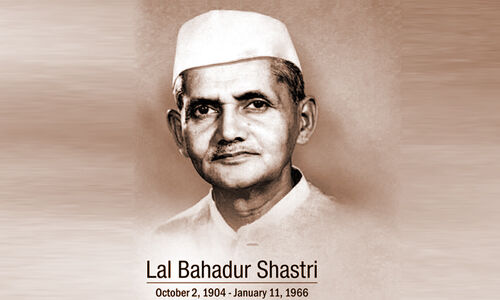Lal Bahadur Shastri, born on October 2, 1904, was a prominent figure in India’s struggle for independence and later served as the second Prime Minister of India. His life and work are characterized by simplicity, humility, and a deep commitment to the welfare of the nation.
Also Read: Asian Games 2023: विथ्या रामराज ने की पीटी उषा के नेशनल रिकॉर्ड की बराबरी
Early Life and Political Journey:
Shastri was born in a humble family in Mughalsarai, Uttar Pradesh. His early years were marked by financial constraints, but he pursued his education with determination. Inspired by the freedom movement, he joined the Non-Cooperation Movement led by Mahatma Gandhi at a young age. His active participation in various movements brought him to the forefront of the Indian National Congress.
Also Read: अनएकेडमी टीचर ने भारत पर आक्रमण करने वाले मोहम्मद ग़ोरी से की पीएम मोदी की तुलना
Prominence During Independence Movement:
Shastri’s leadership qualities and dedication to the cause of independence quickly earned him recognition. He participated in civil disobedience movements and was even jailed for his involvement. His unwavering commitment to non-violence and simplicity made him a respected figure in the Indian National Congress.

Also Read: Delhi Rs 25 Crore Heist: 3 Accused Arrested, Some Gold Recovered
Ministerial Roles:
After India gained independence in 1947, Shastri held various ministerial positions in the government. He served as the Minister of Police and Transport in Uttar Pradesh, where he initiated several progressive reforms. His efficient administration and dedication to public service earned him the nickname “Lal Bahadur” (meaning “Red Brave”).
Also Read: पीएम मोदी ने महात्मा गांधी, लाल बहादुर शास्त्री को दी पुष्पांजलि
Prime Minister of India:
In 1964, Lal Bahadur Shastri was appointed as the Prime Minister of India, succeeding Jawaharlal Nehru. His tenure as Prime Minister was marked by several challenges, including food shortages and the Indo-Pakistani War of 1965. Shastri’s leadership during the war, particularly his slogan “Jai Jawan, Jai Kisan” (Hail the Soldier, Hail the Farmer), inspired the nation and emphasized the importance of both the armed forces and agricultural self-sufficiency.

Also Read: Mahatma Gandhi: A Life of Non-Violence and Transformation
Legacy of Simplicity and Sacrifice:
Lal Bahadur Shastri was known for his unassuming lifestyle. He lived in a small house and refused to use government resources for personal comfort. His dedication to the welfare of the common man and his emphasis on self-sufficiency left an indelible mark on India’s political landscape.
Also Read: नागपुर: भैंस ने निगली सोने की चेन, सर्जरी करके निकाली गई
Tragic End:
Sadly, Shastri’s tenure as Prime Minister was short-lived. He passed away on January 11, 1966, in Tashkent, Uzbekistan, just a day after signing the Tashkent Agreement, which brought an end to the Indo-Pakistani War. The exact circumstances of his death remain a subject of speculation and inquiry.
Also Read: Netflix के बाद अब Disney+ Hotstar की भी पासवर्ड शेयरिंग की सीमा होगी तय
Lal Bahadur Shastri’s life and work continue to inspire generations of Indians. His legacy of simplicity, honesty, and commitment to public service serves as a shining example of leadership in the service of the nation. He remains a beloved figure in India’s history, remembered for his profound impact on the country’s progress and unity.
Also Read: Rs 100 Hammer, Rs 1,300 Disc Cutter: Tools Used In Rs 25 Crore Delhi Heist

